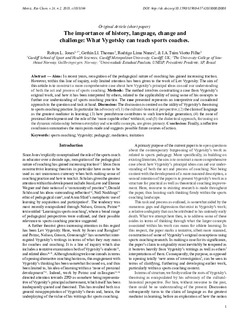The importance of history, language, change and challenge: What Vygotsky can teach sports coaches
Journal article, Peer reviewed
Published version
Permanent lenke
http://hdl.handle.net/11250/2585846Utgivelsesdato
2018Metadata
Vis full innførselSamlinger
Sammendrag
AIMS
In recent years, recognition of the pedagogical nature of coaching has gained increasing traction. However, within this line of inquiry, only limited attention has been given to the work of Lev Vygotsky. The aim of this article is to construct a more comprehensive case about how Vygotsky’s principal ideas can aid our understanding of both the act and process of sports coaching.
METHODS
The method involves constructing a case from Vygotsky’s original work, and how it has been interpreted by others, related to the applicability of using some of his concepts to further our understanding of sports coaching practice. The case presented represents an interpretive and considered approach to the question and task at hand.
DISCUSSION
The discussion is centred on the utility of Vygotsky’s theorising to sports coaching practice. In particular his advocacy of (1) the cultural-historical perspective; (2) the claim of language as the greatest mediator in learning; (3) how perezhivane contributes to such knowledge generation; (4) the zone of proximal development and the role of the ‘more capable other’ within it; and (5) the dialectical approach, focussing on the dynamic relationship between everyday and scientific concepts, are given primacy.
CONCLUSION
Finally, a reflective conclusion summarises the main points made and suggests possible future courses of action.

